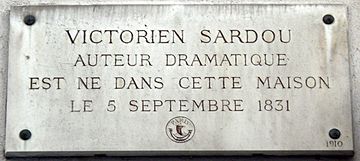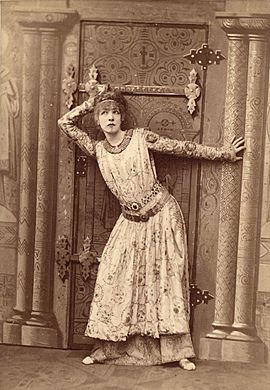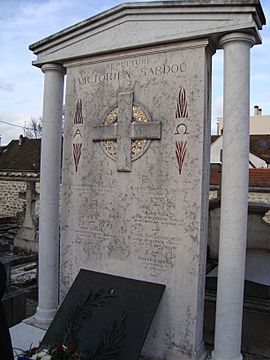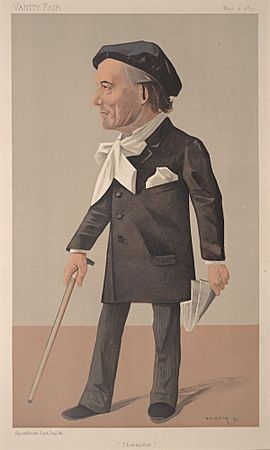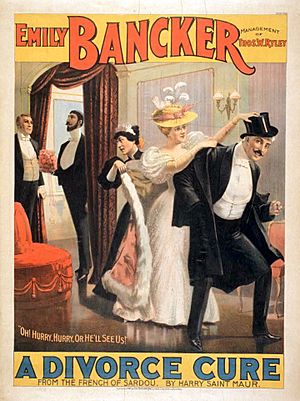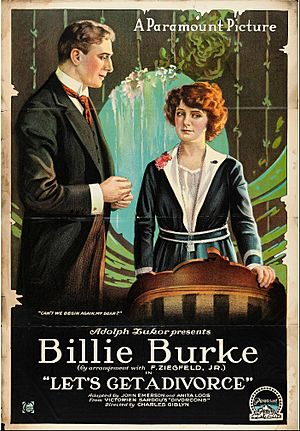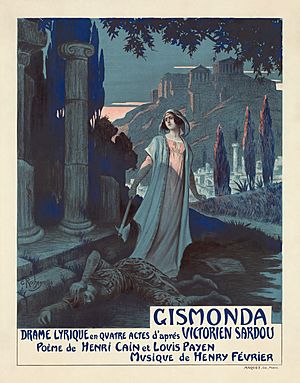Victorien Sardou facts for kids
Quick facts for kids
Victorien Sardou
|
|
|---|---|
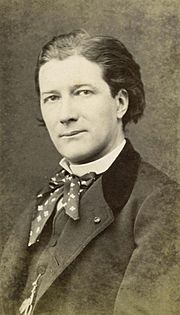
Sardou in 1880
|
|
| Born | Victorien Léandre Sardou 5 September 1831 Paris, France |
| Died | 8 November 1908 (aged 77) Paris, France |
| Occupation | Playwright |
| Period | 19th-century |
| Genre | Well-made play |
Victorien Sardou (born September 5, 1831, died November 8, 1908) was a famous French writer of plays. He is well-known for helping to create a type of play called the "well-made play" with another writer, Eugène Scribe.
Sardou also wrote many plays that became popular operas in the 1800s. For example, his play La Tosca (1887) was used for Giacomo Puccini's famous opera Tosca (1900). His plays Fédora (1882) and Madame Sans-Gêne (1893) also inspired operas by Umberto Giordano.
Contents
Early Life and Challenges
Victorien Sardou was born in Paris, France, on September 5, 1831. His family used to own a large olive farm, but a bad frost destroyed all their trees. This made his family lose all their money.
Victorien's father, Antoine Léandre Sardou, moved to Paris to find work. He tried many jobs, like being a book-keeper, a teacher, and a school principal. Even with all these jobs, he struggled to earn enough money.
When Victorien's father retired, Victorien had to support himself. He had started studying medicine, but he couldn't finish because he didn't have enough money. To make a living, he taught French to foreign students. He also gave lessons in Latin, history, and math, and wrote articles for encyclopedias.
Starting His Career
While working, Victorien Sardou also tried to become a writer. An older writer, Mme de Bawl, encouraged his talent. His first play, La Taverne des étudiants, was performed in Paris in 1854. However, it was not well-received and was quickly stopped.
Other plays he wrote also faced problems. One play was accepted but then canceled. Another play, Le Bossu, was successful, but the credit for it went to other writers. Sardou even showed a play to the famous writer Eugène Scribe, who did not like a certain scene in it.
By 1857, Sardou was very poor and became sick with typhoid fever. He was living in a small, cold room, surrounded by his plays that no one wanted. Luckily, a kind lady named Mlle de Brécourt, who lived in the same building, helped him. She took care of him until he was well.
Mlle de Brécourt also introduced him to her friend, Mlle Déjazet, a famous actress. Déjazet had just opened her own theater. She started performing Sardou's plays, and his luck began to change.
Success on Stage
Even though his first play for Mlle Déjazet was stopped by the censor, his next plays were very successful. Plays like Les Premières Armes de Figaro, Monsieur Garat, and Les Prés Saint Gervais were big hits. His play Les Pattes de mouche (1860), which was later called A Scrap of Paper in English, was also a great success.
Many of Sardou's later plays were written especially for the famous actress Sarah Bernhardt. One of these was Fédora (1882), which even helped make the fedora hat popular! This play was later turned into an opera called Fedora.
Sardou also started adding a lot of history to his plays. For example:
- Théodora (1884) was about the Byzantine Empire.
- La Haine (1874) was based on old Italian stories.
- Patrie! (1869) was about a Dutch uprising in the 1500s. This play also became a popular opera.
- La Sorcière (1904) was set in Spain in the 16th century.
He wrote three plays about the French Revolution: Les Merveilleuses, Thermidor (1891), and Robespierre (1899). His play Gismonda (1894) also became an opera. La Tosca (1887) brought the Napoleonic era to life on stage.
Madame Sans-Gêne (1893) was written for actress Gabrielle Réjane. It was about a brave and kind-hearted wife of a military leader. This play was translated into English and performed in London.
Towards the end of his life, Sardou made recordings of himself reading parts of his plays. His play L'Affaire des Poisons (1907) was very successful when he passed away.
Personal Life and Legacy
Sardou married Mlle de Brécourt, the kind lady who helped him when he was sick. After she passed away, he married Mlle Soulié in 1872. Her father was in charge of the museum at the Palace of Versailles.
In 1877, Victorien Sardou was chosen to be a member of the Académie française, a very important group of French writers and artists. He also received the Legion of Honour, a high award in France, in 1863.
Sardou died in Paris on November 8, 1908, after being ill for some time.
Victorien Sardou was known for his clever and easy-to-understand dialogue in plays. He followed the style of Eugène Scribe, focusing on creating a main problem in the play and then building up to a powerful ending. He believed that conflict was the most important part of a good play.
He often made fun of different types of people in his plays. For example, he poked fun at selfish middle-class people in Nos Intimes (1861) and old-fashioned ideas in Les Ganaches (1862).
The Irish writer George Bernard Shaw made up the word "Sardoodledom" to describe Sardou's plays. Shaw thought Sardou's plays were too focused on complicated plots and didn't have enough deep ideas. However, many people, like producer Sir Squire Bancroft, greatly admired Sardou's work and the performances of his plays.
Today, you can find streets named after Victorien Sardou in Paris, Lyon, and Saint-Omer. Also, a famous dish called Eggs Sardou was created in his honor at a restaurant in New Orleans.
Works
Stage Plays
- La Taverne des étudiants (1854)
- Les Premières Armes de Figaro (1859)
- Les Gens nerveux (1859)
- Les Pattes de mouche (A Scrap of Paper; 1860)
- Monsieur Garat (1860)
- Les Femmes fortes (1860)
- L'écureuil (1861)
- L'Homme aux pigeons (1861)
- Onze Jours de siège (1861)
- Piccolino (1861)
- Nos Intimes! (1861)
- Chez Bonvalet (1861)
- La Papillonne (1862)
- La Perle Noire (The Black Pearl; 1862)
- Les Prés Saint-Gervais (1862)
- Les Ganaches (1862)
- Bataille d'amour (1863)
- Les Diables noirs (1863)
- Le Dégel (1864)
- Don Quichotte (1864)
- Les Pommes du voisin (1864)
- Le Capitaine Henriot (1864)
- Les Vieux Garçons (1865)
- Les Ondines au Champagne (1865)
- La Famille Benoîton (1865)
- Les Cinq Francs d'un bourgeois de Paris (1866)
- Nos Bons Villageois (1866)
- Maison neuve (1866)
- Séraphine (1868)
- Patrie! (Fatherland) (1869)
- Fernande (1870)
- Le roi Carotte (1872)
- Les Vieilles Filles (1872)
- Andréa (1873)
- L’Oncle Sam (Uncle Sam; 1873)
- Les Merveilleuses (1873)
- Le Magot (1874)
- La Haine (Hatred; 1874)
- Ferréol (1875)
- Piccolino (1876)
- L'Hôtel Godelot (1876)
- Dora (1877)
- Les Exilés (1877)
- Les Bourgeois de Pont-Arcy (1878)
- Les Noces de Fernande (1878)
- Daniel Rochat (1880)
- Divorçons! (Let's Get a Divorce; 1880)
- Odette (1881)
- Fédora (1882)
- Théodora (1884)
- Georgette (1885)
- Le Crocodile (1886)
- La Tosca (1887)
- Marquise (1889)
- Belle-Maman (1889)
- Cléopâtre (1890)
- Thermidor (1891)
- Madame Sans-Gêne (1893)
- Gismonda (1894)
- Marcelle (1895)
- Spiritisme (1897)
- Paméla (1898)
- Robespierre (1899)
- La Fille de Tabarin (1901)
- Les Barbares (1901)
- Dante (1903)
- La Sorcière (The Sorceress; 1903)
- Fiorella (1905)
- L'Espionne (1906)
- La Pisie (1906)
- The Affair of the Poisons (1907)
Books Written
- Rabàgas (1872)
- Daniel Rochet (1880)
Works Based on Sardou's Plays
Plays Translated
- Nos Intimes! (1862), became Friends or Foes?
- La Papillonne (1864), became Taming of a Butterfly
- Le Degel (1864), became Adonis Vanquished
- Les Ganaches (1869), became Progress
- Nos Intimes! (1872), became Our Friends
- Les Pres Saint-Gervais (1875)
- Dora (1877), became Diplomacy
- Divorçons! (1882), became Cyprienne
- Robespierre
Operas and Musicals
- Patrie! (1886) by Emile Paladihle
- Fedora (1898) by Umberto Giordano
- Tosca (1900) by Giacomo Puccini
- Les Merveilleuses (1907), a musical play
- Théodora (1907) by Xavier Leroux
- Madame Sans-Gêne (1915) by Umberto Giordano
- Gismonda (1919) by Henry Février
Movies Based on His Works
- La Tosca (1908)
- Cleopatra (1912)
- Princess Romanoff (1915)
- The Song of Hate (1915)
- Marcella (1915)
- Odette (1916)
- The Witch (1916)
- Diplomacy (1916)
- Váljunk el! (1916)
- The Chalice of Sorrow (1916)
- Ferréol (1916)
- Madame Guillotine (1916)
- Fedora (1916)
- White Nights (1916)
- Patrie (1917)
- Andreina (1917)
- Fernanda (1917)
- Cleopatra (1917)
- Az anyaszív (1917)
- Tosca (1918)
- La Tosca (1918)
- Let's Get a Divorce (1918)
- Love's Conquest (1918)
- Fedora (1918)
- The Burden of Proof (1918)
- I nostri buoni villici (1918)
- Spiritismo (1919)
- Dora o Le spie (1919)
- Three Green Eyes (1919)
- Giorgina (1919)
- Ferréol (1920)
- I borghesi di Pontarcy (1920)
- Napoleon and the Little Washerwoman (1920)
- Theodora (1921)
- Rabagas (1922)
- L'Espionne (1923)
- Madame Sans-Gêne (1925)
- Kiss Me Again (1925)
- Fedora (1926)
- Diplomacy (1926)
- Don't Tell the Wife (1927)
- Odette (1928)
- A Night of Mystery (1928)
- The Woman from Moscow (1928)
- L'Évadée (1929)
- Fedora (1934)
- Odette (1934)
- Les Pattes de mouche (1936)
- Marcella (1937)
- Tosca (1941)
- That Uncertain Feeling (1941)
- Madame Sans-Gêne (1941)
- Fedora (1942)
- Dora, la espía (1943)
- Madame Sans-Gêne (1945)
- Pamela (1945)
- La señora de Pérez se divorcia (1945)
- En tiempos de la inquisición (1946)
- Patrie (1946)
- Distress (1946)
- El precio de una vida (1947)
- The Affair of the Poisons (1955)
- Tosca (1956)
- Amor para Três (1960)
- Madame (1961)
- La Tosca (1973)
- Tosca (2001)
Images for kids
See also
 In Spanish: Victorien Sardou para niños
In Spanish: Victorien Sardou para niños
 | Sharif Bey |
 | Hale Woodruff |
 | Richmond Barthé |
 | Purvis Young |


